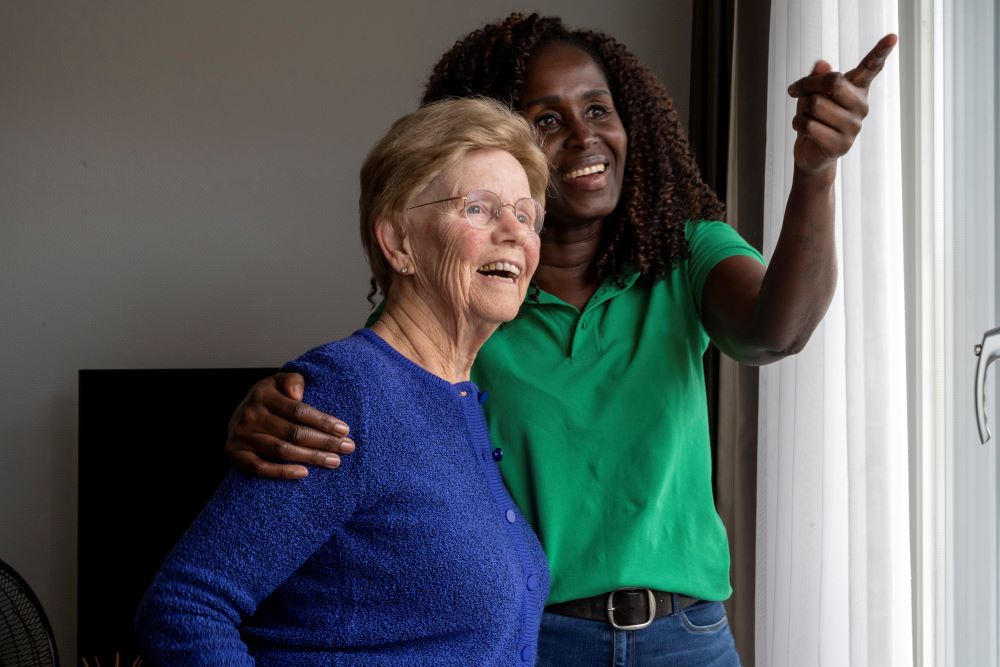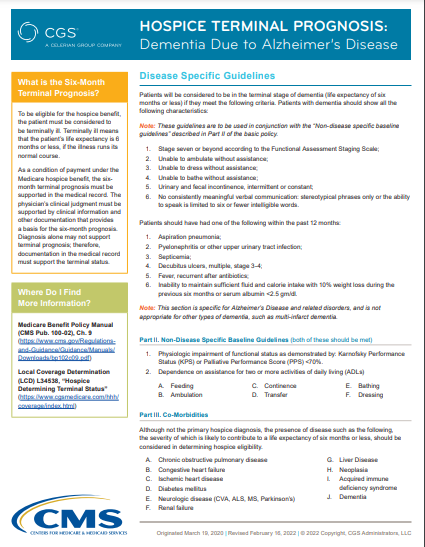Is Hospice for Someone with Dementia?
If you are a dementia caregiver, you may have come across discussions about “Dementia Hospice” in online groups. But for many, the idea of hospice care, let alone dementia-specific hospice care, can be overwhelming and confusing. This post is here to clarify the ins and outs of hospice care—covering the who, what, when, where, why, and how of dementia hospice.
The History of Hospice
The concept of hospice care dates back to the 11th century, originating as a place of refuge for sick and dying travelers and pilgrims. In 1967, Dr. Cicely Saunders, a nurse-turned-doctor, founded the first modern hospice in London. This hospice focused on comfort care, providing relief for physical pain and emotional distress, rather than attempting to cure the patient’s illness.
The philosophy of hospice care gradually expanded, embracing the right of patients to decide where they wanted to pass away and focusing on providing a peaceful, dignified end-of-life experience.

The Philosophy Behind Hospice Care
Hospice care emphasizes the treatment of the person, not just the disease. It focuses on the quality of life, supporting the individual’s physical, emotional, and spiritual needs. You may hear the term “comfort care,” which generally means allowing nature to take its course without aggressive treatments.
For a person with dementia, comfort care means discontinuing treatments that are no longer effective or desirable. This might include stopping unnecessary hospital visits, surgeries, or interventions that would not improve the person’s quality of life. Instead, the goal is to manage symptoms and provide as much peace as possible for the person nearing the end of their life.
Levels of Hospice Care and Where It Is Provided
Hospice care is designed to meet the unique needs of patients nearing the end of life. The levels of hospice care offer varying degrees of support based on the patient’s condition and needs. Understanding these levels can help you make informed decisions about what type of care is best for your loved one with dementia.

1. Routine Hospice Care
What It Is:
Routine hospice care is the most common level of care. It is designed to provide ongoing support in the place where the patient calls home. This could be at home, in an assisted living facility, a nursing home, or a memory care unit.
Where It’s Provided:
- Home: If your loved one is living in their own home, hospice services will be provided there. This includes visits from the hospice team as needed (such as nursing, social workers, chaplains, and aides) and 24/7 on-call support.
- Assisted Living or Memory Care Facilities: Many people with dementia reside in assisted living or memory care units. If your loved one is in one of these settings, hospice can be provided there as well. The hospice team coordinates with the facility’s staff to ensure comprehensive care.
- Nursing Homes: If your loved one is in a skilled nursing facility, hospice care can be arranged through the facility. The hospice team will collaborate with the nursing home to provide comfort and symptom management.
Key Features:
- Visits from hospice nurses and aides (usually every few days).
- Regular check-ins from social workers and chaplains to offer emotional and spiritual support.
- Coordination with the care team at the facility where your loved one resides, if applicable.

2. Continuous Hospice Care (Crisis Care)
What It Is:
Continuous hospice care, also called crisis care, is for situations when a patient’s symptoms become uncontrollable and require around-the-clock medical attention. This level of care is typically short-term and is used to manage a sudden medical crisis.
Where It’s Provided:
- Home: If your loved one is at home and their symptoms worsen (such as severe pain, agitation, or shortness of breath), continuous care can be provided at home. A nurse stays at the home for at least 8 hours a day to manage these symptoms.
- Care Facilities: If your loved one is in an assisted living facility, nursing home, or hospice facility, the same level of care can be provided. Nurses will stay on-site to address the patient’s immediate needs.
Key Features:
- 24/7 nursing care for a brief period (at least 8 hours).
- Focused on managing specific symptoms that cannot be controlled in a less intensive setting.
- Typically provided for a short period until the crisis is managed.

3. Respite Hospice Care
What It Is:
Respite hospice care provides temporary relief for family caregivers who need a break from their caregiving duties. It allows the caregiver to rest and recharge while their loved one receives care in a controlled, comfortable environment.
Where It’s Provided:
- Nursing Homes or Hospice Facilities: Respite care is typically provided in a nursing home, hospice center, or other specialized facility. This is a short-term stay, usually lasting 5 days or less, where the hospice team cares for your loved one in a safe environment while you take a break.
Key Features:
- Short-term care (usually no more than 5 days).
- A temporary placement in a facility, providing caregivers the opportunity to rest.
- Care is provided by the hospice team, including nurses, aides, and social workers.

4. General Inpatient Hospice Care
What It Is:
General inpatient hospice care is provided when a patient’s symptoms are no longer manageable at home or in a residential care facility. This level of care is appropriate for those experiencing complex symptoms such as uncontrolled pain, breathing issues, or severe agitation that require a higher level of medical intervention.
Where It’s Provided:
- Hospitals or Hospice Inpatient Units: General inpatient care is typically provided in a hospital or a dedicated hospice inpatient facility. These locations are equipped to manage complex symptoms and provide intensive support in a comfortable, peaceful environment.
- Return to Home After Stabilization: Once symptoms are controlled, the patient may return to their home or another care setting with appropriate support.
Key Features:
- Provided in a hospital or inpatient hospice facility.
- Intensive symptom management for conditions that cannot be treated at home.
- Short-term care to stabilize symptoms before transitioning back to a lower level of care.
Summary of Where Hospice Care Is Provided:
Hospice care is flexible and can be provided in various settings to meet the patient’s needs. These include:
- Home: For those who prefer to remain in their own environment.
- Assisted Living or Memory Care: For those living in long-term care facilities.
- Nursing Homes: If the patient is already in a nursing facility.
- Hospice Inpatient Units or Hospitals: When more intensive care is needed.
By understanding the different levels of hospice care and where they are provided, you can make informed decisions about the type of care that will best meet your loved one’s needs. Whether you’re caring for someone with dementia at home or in a facility, hospice care offers support and comfort to both the patient and their caregivers, ensuring that the end-of-life experience is as peaceful and dignified as possible.
Who qualifies for Dementia Hospice Care?
To qualify for hospice, including dementia-related hospice care, a person must meet certain criteria established by the Centers for Medicare & Medicaid Services (CMS).
General Requirements:
- Life Expectancy of 6 Months or Less: Without aggressive treatment, the patient must have a life expectancy of 6 months or less.
- Eligibility for Dementia Hospice Care: Specific criteria for dementia include:
- Functional Assessment Staging (FAST) Scale: The person must score 7 or higher on the FAST scale, which is used to measure the stages of dementia.
- Karnofsky Performance Scale & Palliative Performance Scale (PPS): These scales assess the person’s functional status.
- Co-Morbid Conditions: At least one co-existing medical condition must be present, such as pneumonia, malnutrition, or severe weight loss.

When is it time for Dementia Hospice?
The progression of dementia varies greatly from person to person. While the average life expectancy after a dementia diagnosis is 4-8 years, some individuals may live for 20 years or more. Hospice care is typically considered when a person is no longer benefiting from aggressive treatments and has entered the final stages of the disease.
People with dementia often die from complications such as pneumonia, dehydration, malnutrition, infections, falls, or pressure sores. At this stage, if the family decides they no longer want aggressive medical treatments and wish to focus on comfort care, it’s time to consider hospice care.
Remember, hospice is focused on quality of life, not the quantity of life.

How Long Can Someone Stay in Hospice Care?
Hospice care is reevaluated regularly. After the initial 90 days, the person will undergo another assessment every 60 days to determine if they still meet the criteria. If their condition improves or they no longer meet the eligibility requirements, they may be discharged from hospice.
Who Pays for Dementia Hospice?
Hospice care is available through various payment sources, including:
- Medicare
- Medicaid
- Private insurance
- Charitable organizations
- Individual or family contributions
In the United States, Medicare covers the costs of hospice care for individuals who meet the eligibility criteria, making it a benefit available to most people.
What does Hospice provide?
Hospice care provides a wide range of support services to patients and their families, including:
- Nursing Care: An RN visits the patient at least every 14 days.
- Assistance with Activities of Daily Living: Hospice staff often provide aides to help with bathing and personal care.
- Social Work & Chaplain Services: Social workers offer emotional support, while chaplains provide spiritual care, regardless of religious affiliation.
- Medications: Hospice covers medications that are related to the hospice diagnosis. However, it’s important to note that once hospice care is initiated, Medicare will no longer cover prescriptions unrelated to the hospice diagnosis.
- Equipment and Supplies: Hospice companies provide necessary supplies, including incontinence supplies, wound care materials, and other comfort-related items.
Bereavement Support
One often-overlooked benefit of hospice care is the bereavement follow-up provided to families. Under Medicare guidelines, hospice care includes 13 months of bereavement support for the family after the patient passes away, helping them navigate the grieving process.
Conclusion
Hospice care can be a vital resource for families caring for someone with dementia. It provides much-needed support for both the patient and their caregivers, focusing on comfort and dignity during the final stages of life. If you’re unsure whether your loved one qualifies for hospice care, don’t hesitate to reach out to a hospice provider for an evaluation. They can help guide you through the process and provide valuable support when it’s most needed.

Free Information
See our blog for dementia education and sign up for our newsletter with tips for dementia caregivers!
ALZLOG App for Dementia Caregivers
Understand, assess, and track dementia stages and manage caregiving with ease with the user-friendly Alzlog app, designed to support caregivers every step of the way.
Private Facebook Caregiver Support Group
A community where you can connect with others facing similar challenges, share experiences, and find support.
Understanding Dementia: A Guide for Family Members Course
Discover the stages of dementia, develop patience, and learn effective caregiving techniques with our easy-to-follow Understanding Dementia course.
Hi, I'm Larea, I am a Registered Nurse specializing in Dementia Care, with 30 years of experience supporting dementia patients and their families. Over the years, I have provided care in diverse settings, including homes, hospitals, nursing homes, assisted living facilities, and hospice. My passion is guiding caregivers, sharing my knowledge and experience to help them navigate the challenges of dementia care with confidence and compassion.










0 Comments